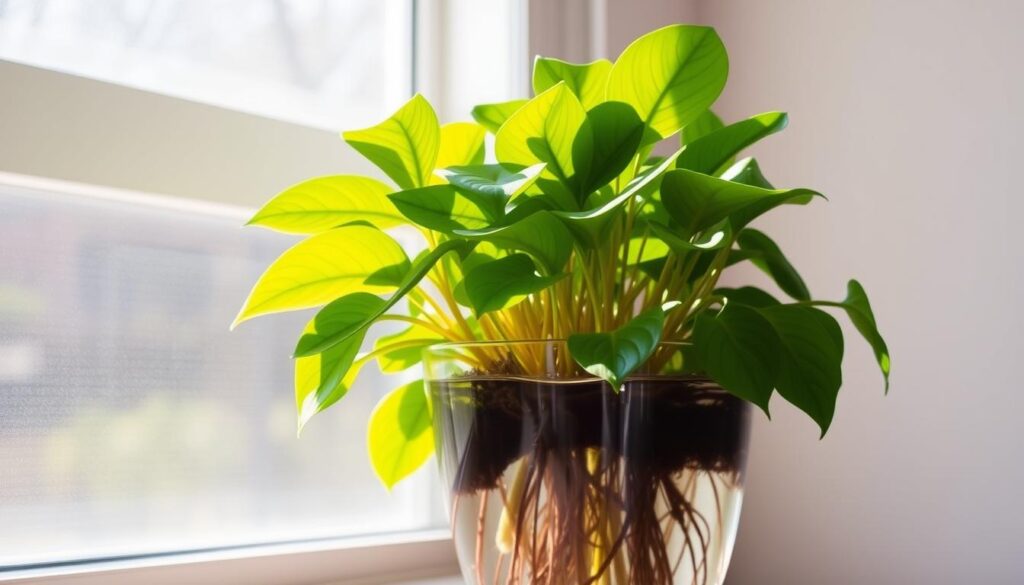Are you interested in growing a lush, trailing pothos plant in water? Pothos, also known as devil’s ivy, is a favorite among houseplant lovers. It’s easy to care for and can grow well in many conditions. Growing pothos in water is simple and lets you watch the roots grow. This guide will teach you how to grow and care for pothos in water, from starting cuttings to keeping plants healthy.
Key Takeaways
- Pothos is a versatile and low-maintenance houseplant that can thrive in water.
- Growing pothos in water allows you to observe the root growth and can be used as a decorative feature.
- It takes about 10-14 days for initial roots to form when propagating pothos in water.
- Proper care, including regular water changes and fertilization, is essential for healthy pothos plants in water.
- Pothos can be transitioned from soil to water, but the adjustment may take some time.
What is Pothos and Why Grow it in Water?
Pothos, also known as devil’s ivy, is a favorite among houseplant lovers. It’s known for being easy to care for and adaptable. This plant thrives in water, making it perfect for indoor gardens.
Pothos as a Low-Maintenance Houseplant
Pothos plants are great for beginners or those with little time to care for plants. They can grow well in different light conditions and need water only occasionally. This makes them a great choice for any home.
Benefits of Growing Pothos in Water
- Allows for easy water-rooting of pothos cuttings, enabling propagation and expansion of your plant collection.
- Provides a visually appealing way to observe the growth and development of the plant’s roots.
- Can be used as semi-aquatic plants for fish tanks or other indoor water features, adding a natural touch to the decor.
- Reduces the need for frequent watering compared to soil-based pothos, making it a convenient option for busy households.
Growing pothos plants in water is rewarding and easy. It’s a great choice for anyone looking to enjoy the beauty of devil’s ivy without much effort.
Supplies Needed to Grow Pothos in Water
To grow a pothos plant in water, you need a few basic things. First, get a clean, watertight container like a glass jar or vase. This lets you see the roots and water level easily. Tap water works, but if it’s chlorinated or hard, use filtered water for your pothos.
You’ll also need a water-soluble fertilizer. Pothos plants in water need regular feeding to grow well. Choose a diluted liquid fertilizer made for aquatic or hydroponic plants.
Containers for Growing Pothos
When picking a container for your pothos, go for clear or transparent ones. This lets you watch the roots and water level. Glass jars or vases are great because they don’t add harmful stuff to the water. Don’t use opaque containers, as they can hurt root growth.
Water and Fertilizer Requirements
- Use tap water or filtered water, free of high chlorine or mineral content.
- Fertilize your pothos regularly with a diluted liquid, water-soluble fertilizer formulated for aquatic or hydroponic plants.
- The fertilizer should be applied at a reduced strength compared to soil-grown plants, as the water-based medium requires a more delicate balance.
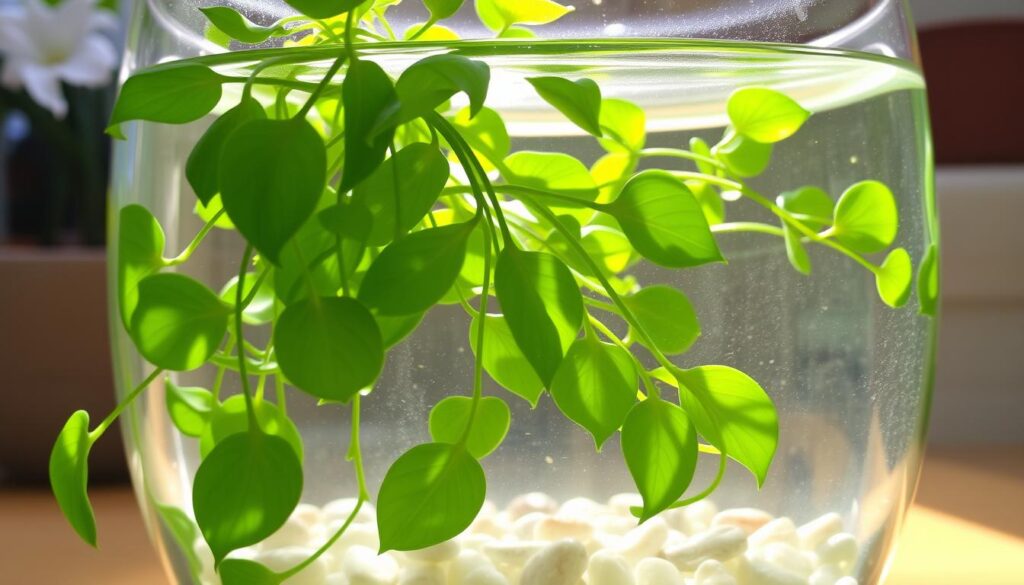
With the right supplies, you can grow pothos in water successfully. This low-maintenance, yet striking houseplant will bring beauty to your space.
How to Propagate Pothos Cuttings in Water
Propagating pothos cuttings in water is easy and effective. It helps the cuttings grow strong roots before moving them to soil. This method is great for growing new pothos plants or refreshing old ones.
Selecting and Preparing Pothos Cuttings
First, pick a healthy pothos plant. Take 3-4 node cuttings from the stem. Make sure each cutting has 3-4 nodes for new roots.
Remove the lower leaves to expose the nodes. Then, trim the stem just below a node. This prepares your cuttings for water propagation.
- Choose a healthy, disease-free pothos stem to take your cuttings from.
- Cut 3-4 inch sections, making sure each cutting has 3-4 nodes.
- Remove the lower leaves, leaving the nodes exposed.
- Trim the stem just below a node, creating a clean cut.
Now, your cuttings are ready for water propagation.
| Propagation Method | Rooting Time | Success Rate |
|---|---|---|
| Pothos Propagation in Water | 7-14 days | High |
| Pothos Propagation in Soil | 2-4 weeks | Moderate |
Water is better for pothos cuttings to root fast. Roots usually form in 7-14 days. This is why many prefer water propagation.
“Propagating pothos in water is the most popular and common method, as the cuttings root faster than they do in soil.”
Grow Pothos in Water Step-by-Step
If you want to grow pothos in water, follow these easy steps. Pothos is a tough and easy-to-care-for houseplant that does well in water. It’s perfect for beginners. Here’s how to start growing your pothos in water.
- Choose healthy pothos cuttings with 3-4 nodes. Remove the lower leaves. The best time to start is from spring to early fall, when the plant is growing fast.
- Put the cuttings in a clean container filled with water. Make sure the nodes are covered. This method is simple and popular. It takes 3 to 6 weeks for roots to grow.
- Place the container in a spot with bright, indirect light. This is the best light for growing pothos.
- Check the water level and change it every 1-2 weeks. This keeps the water fresh. For water rooting, change the water every couple of days.
When the cuttings have 1 to 2 inches of roots, you can move them to soil. Soil with good drainage is best. Also, increase the humidity around the soil to help the roots grow faster.
“Over 1,500 articles penned by Emma Loewe on various topics from the water crisis in California to urban beekeeping.”
By following these steps, you’ll grow a healthy pothos plant in water. Remember, the key is to provide the right light and change the water regularly.
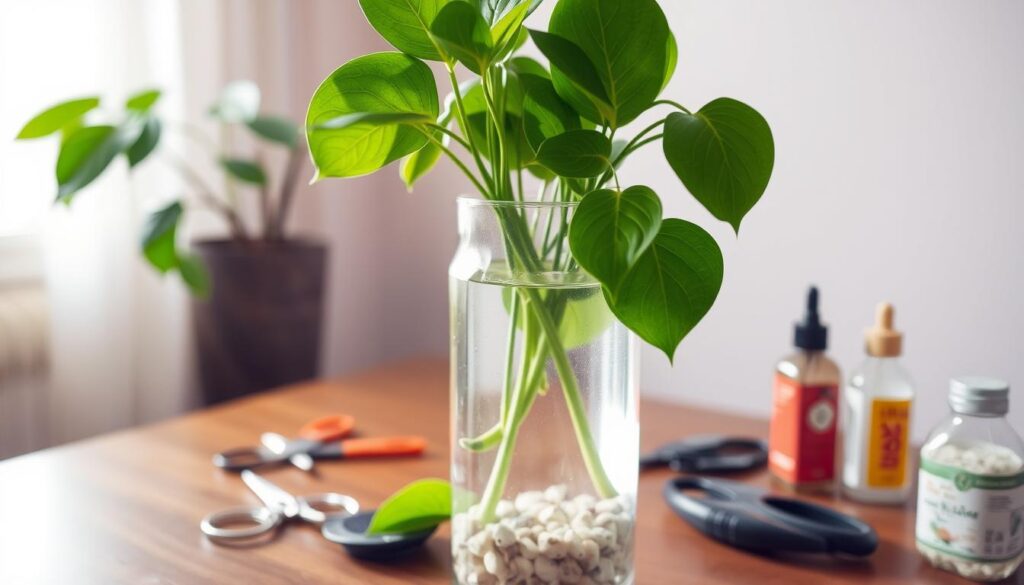
Pothos Propagation Methods
Pothos can also be grown through division or layering. Division works best in late winter or early spring. Layering, where stems are laid on soil, is another good method.
| Propagation Method | Time to Root | Recommended Time |
|---|---|---|
| Water Propagation | 1-3 weeks | Spring to early fall |
| Division | 2-4 weeks | Late winter to early spring |
| Layering | 4-6 weeks | Spring to early fall |
Choosing any propagation method, the key is to provide the right environment and care. With patience and attention, you can enjoy the beauty and benefits of this versatile houseplant.
Caring for Pothos Grown in Water
Maintaining a pothos plant grown in water is easy. Change the water every 1-2 weeks to keep it fresh and oxygenated. Also, feed your pothos with a diluted liquid fertilizer every 4-6 weeks. This gives it the nutrients it needs to grow well in water.
Changing the Water Regularly
Changing the water is key for your pothos plant’s health. Stagnant water lacks oxygen and can collect debris. Regular water changes keep your plant hydrated and growing well. Use clean, dechlorinated water to refill the container.
Fertilizing Your Pothos Plant
To give your pothos plant in water the nutrients it needs, use a diluted liquid fertilizer. Dyna-Gro Grow is a good choice, mixed at 1 teaspoon per gallon of water. This provides the minerals and trace elements it needs to thrive in water.
| Nutrient Requirements for Pothos in Water | Recommended Fertilizer | Dilution Ratio |
|---|---|---|
| Pothos plants grown in water require a steady supply of essential nutrients to maintain healthy growth. | Dyna-Gro Grow liquid fertilizer | 1 teaspoon per gallon of water |
By changing the water regularly and fertilizing your pothos plant, it will thrive. This care ensures your pothos continues to purify the air. With proper care, a pothos plant can live indefinitely in water, offering lush foliage for years.
Monitoring Growth and Maintenance
As your pothos grows in water, watch its appearance closely. Healthy pothos will have vibrant, green, and glossy leaves. It will also have a strong root system. But, if you see yellow leaves or signs of root rot, change the water and check the roots right away.
Signs of Healthy Pothos Plants in Water
- Green, glossy leaves
- Strong, well-developed root system
- Consistent growth and new leaf production
- Absence of yellowing, wilting, or discoloration
| Healthy Pothos Characteristics | Unhealthy Pothos Symptoms |
|---|---|
| Green, vibrant leaves | Yellowing or browning leaves |
| Robust, white roots | Discolored, slimy, or rotten roots |
| Steady growth and new leaf production | Stunted growth or lack of new leaves |
| No visible pests or diseases | Presence of pests, such as spider mites or mealybugs |
By closely monitoring the growth and health of your pothos in water, you can quickly identify and address any issues. This ensures your plant continues to thrive and adds lush greenery to your indoor space.
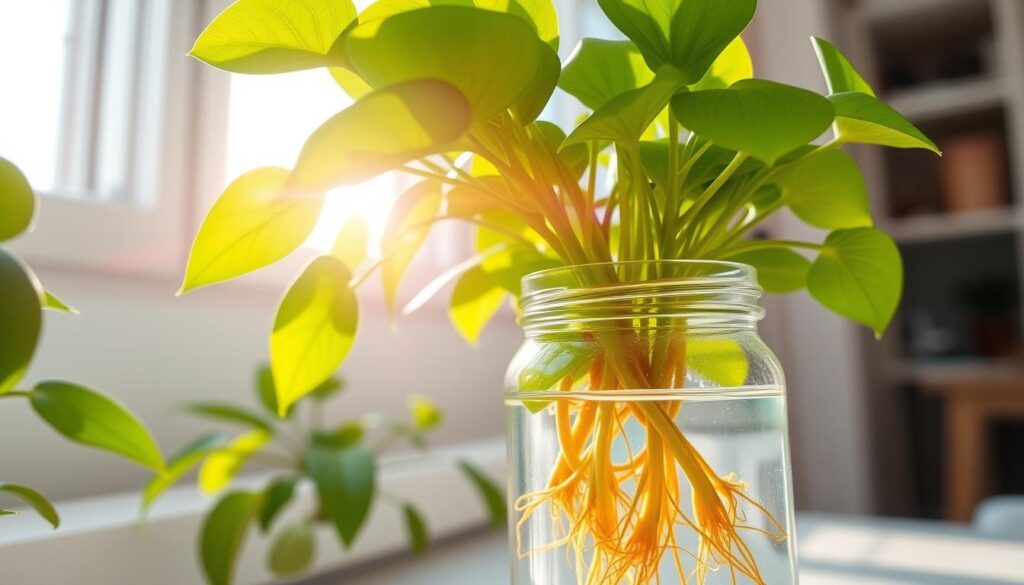
“Consistent monitoring and prompt problem-solving are key to maintaining a thriving pothos plant in water.”
Grow Pothos in Water
Growing pothos in water is easy and rewarding. It’s a great way to enjoy this low-maintenance houseplant. By propagating cuttings in water and giving them the right care, you can grow thriving pothos plants. These plants add greenery and interest to your home.
Propagation helps plants grow back, and pothos is one of the easiest to do. It saves money by making plants grow continuously without extra costs. It’s also a way to make a sad-looking pothos plant look new again.
To propagate pothos in water, you need tools like sterile scissors, tap water, and a clear container. You also need potting mix and a pot with a drainage hole. Cuttings from the plant must have nodes for root growth. It takes about one to three weeks for roots to grow in water.
| Propagation Benefits | Propagation Steps |
|---|---|
|
|
After transferring cuttings to soil, they need care. Water them when the mix feels dry and give them indirect light. Different pothos types may grow at different rates. Spring and summer are the best times to propagate pothos.
While rooting hormone isn’t needed for pothos water propagation, it can help roots grow faster. Monstera and philodendron can also be propagated this way. With proper care, growing pothos in water can add elegance to your home.
Transitioning Pothos from Soil to Water
If you have a pothos plant in soil, you can move it to water. First, remove the plant from the soil. Then, rinse the roots to get rid of dirt. Finally, put the plant in a water container.
Be gentle when moving the plant. This helps avoid harming the roots.
The pothos might feel stressed at first. But, with the right care, it can grow well in water. Here’s how to make the transition smooth:
- Gently take the pothos out of its soil, being careful with the roots.
- Rinse the roots well under running water to remove any dirt.
- Put the plant in a clean, clear container filled with fresh water. Make sure the roots are fully covered.
- Place the container in a spot with bright, indirect light, like near a north-facing window.
- Check the water level and change it every two weeks. This keeps the roots oxygenated and prevents algae.
- Feed the pothos with a diluted liquid fertilizer every 4-6 weeks. This supports its growth in water.
With patience and the right care, your pothos will thrive in water. It will show off its lush, green foliage. Moving it to water makes caring for it easier and more convenient.
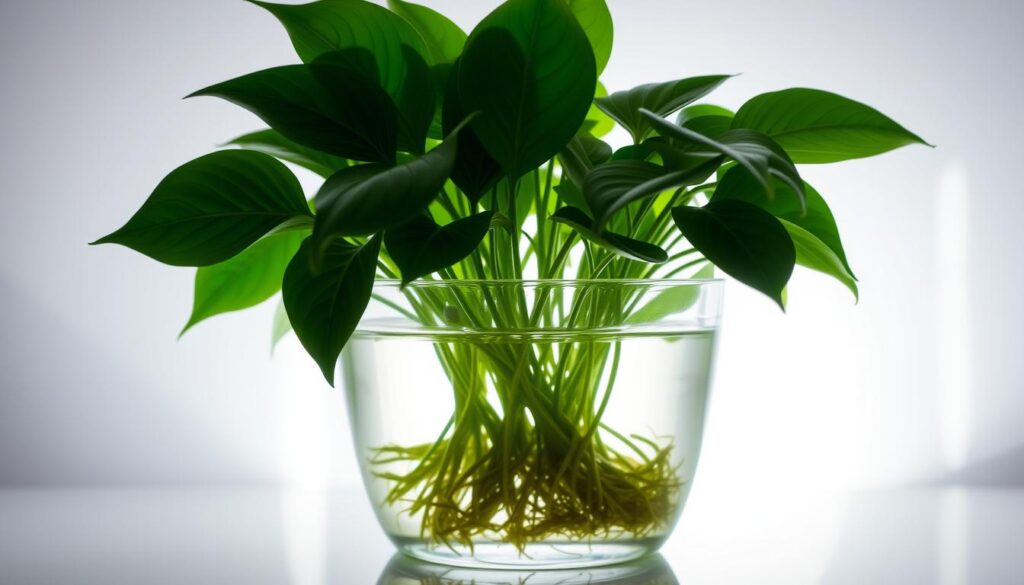
Remember, moving a pothos to water needs some adjustment. But, with the right steps, you can make a successful transplant to water. Your pothos will be beautiful for many years.
Tips for Keeping Pothos Thriving in Water
Caring for your pothos plant in water is rewarding but needs attention. To keep it thriving, focus on the right light and controlling algae.
Proper Light Conditions
Pothos plants adapt well to different lights but prefer medium to bright, indirect light. Place your pothos near a window with plenty of natural light but avoid direct sunlight. This can scorch the leaves. Monitor your plant’s growth and adjust the light as needed for its health.
Controlling Algae Growth
Algae buildup is a common issue with pothos in water. Use an opaque container to block light from reaching the water. Also, change the water every few days to keep it fresh and oxygenated. Adding a small amount of hydrogen peroxide can help prevent algae.
By focusing on light and algae control, you can create a great environment for your pothos. This will make your indoor space lush and vibrant.
Benefits of Growing Pothos in Water Vs Soil
Growing pothos in water has many perks over soil. It’s super easy to care for. You don’t need to worry about when to water it because the roots are always in water. This is great for people who are always busy or new to gardening.
Watching your pothos grow in water is also fun. You can see the roots grow right before your eyes. This lets you know if your plant is doing well and if it needs anything.
| Pothos in Water | Pothos in Soil |
|---|---|
| Easier to maintain, no regular watering required | Requires more attention to watering schedule |
| Allows for easy observation of root growth | Roots are hidden, making it harder to monitor |
| Typically faster propagation rate | Produces sturdier, more robust plant growth |
But, pothos in soil might grow faster and look stronger. Soil roots are usually thicker and help the plant stay healthy.
So, whether you choose water or soil, it depends on what you like and need. Both ways can make your pothos a beautiful, air-purifying addition to your home.
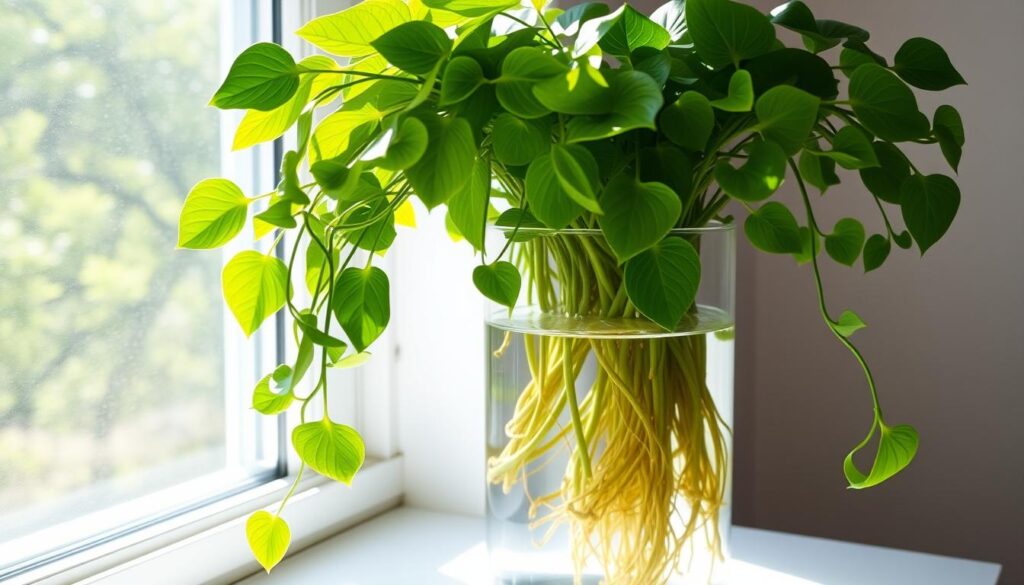
Common Problems with Pothos in Water
Pothos plants are known for being easy to care for. But, they can still face issues when grown in water. Yellowing leaves and root rot are two common problems.
Yellowing Leaves
Yellowing leaves are a common issue with pothos in water. This can happen due to a lack of nutrients or stale water. To avoid this, change the water often and use a balanced water-soluble fertilizer.
Root Rot and Other Diseases
Root rot and fungal diseases can also affect pothos in water. These problems usually come from not changing the water enough or a dirty container. Watch for mushy, discolored roots and deal with them quickly to stop the disease from spreading.
Besides yellowing leaves and root rot, pothos in water might face pests, less variegation, and slow growth. To prevent these issues, change the water regularly, ensure proper lighting, and keep a close eye on your plant.
| Problem | Possible Causes | Solutions |
|---|---|---|
| Yellowing Leaves | – Nutrient deficiency – Stagnant water |
– Change water regularly – Use water-soluble fertilizer |
| Root Rot | – Infrequent water changes – Dirty container |
– Change water frequently – Maintain clean container |
| Pests | – Mealybugs – Spider mites |
– Inspect plants regularly – Use appropriate pest control measures |
By tackling these common issues, you can keep your pothos healthy and vibrant in water.
Creative Ways to Display Pothos in Water
Pothos is a favorite indoor plant that can grow in water. This makes it a unique and attractive way to add greenery to your home. Its vines cascade beautifully, making it perfect for creative displays.
Clear glass containers, like vases or test tubes, are great for showing off pothos roots. The clear material lets you see the roots grow, which is fascinating. You can also add pebbles, stones, or small figurines to make the display more interesting.
Hanging pothos in water-filled containers is another creative idea. It creates a floating display that adds elegance to any room. This method also saves space and looks great in your indoor garden.
If you enjoy growing plants, pothos water displays are perfect for propagation. You can grow new plants from cuttings in water. Watching the roots grow and then transplanting the new plants is rewarding.
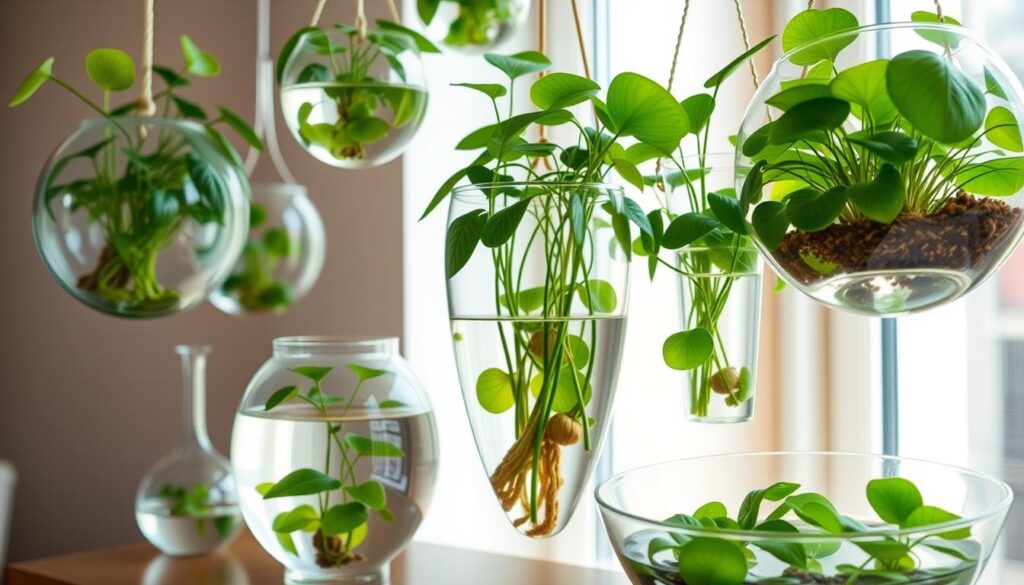
Choosing any of these methods, growing pothos in water is a great way to beautify your indoor space. The pothos plant shines with its vibrant foliage and trailing vines in water displays.
Pothos Water Propagation Tips for Beginners
Starting with pothos water propagation is exciting! Pothos are easy to care for and grow well in low-light areas. Water propagation is a favorite method for growing these plants.
- Start with healthy, disease-free pothos cuttings. They should have at least 3-4 nodes. These nodes are where the roots will grow.
- Put the cuttings in a clean, clear container filled with fresh water. Place it in a spot with bright, indirect light.
- Change the water every few days to keep it fresh and full of oxygen. This helps the roots grow faster.
- Feed your pothos plant with a balanced liquid fertilizer every 4-6 weeks. Use half the recommended strength to avoid burning the roots.
- Wait 2-8 weeks for the roots to grow. When they are about 4 inches long, it’s time to move them to soil.
Propagating pothos in water is a great way to grow new plants. Follow these beginner tips for propagating pothos in water to start your collection.
“Pothos can live in water for a long time if provided with fresh water and nutrients.”
| Propagation Method | Average Rooting Time | Success Rate |
|---|---|---|
| Water Propagation | 10-14 days | High |
| Soil Propagation | 2-4 weeks | Moderate |
Conclusion
Growing pothos in water is a fun and easy way to enjoy this popular houseplant. By following the steps in this guide, you can grow and care for pothos plants in water. This will add a unique and beautiful touch to your home.
Pothos is a tough and adaptable plant that does well in water. It’s perfect for both new and experienced plant lovers. This guide has given you the tools to succeed in growing pothos in water.
Using the tips from this article, you can create a beautiful display of water-grown pothos. It will not only make your space look better but also clean the air. Enjoy watching your pothos grow and thrive in water.
